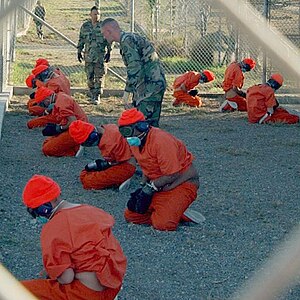Guantanamo Bay detention camp
 |
This article's content is marked as Mature The page Guantanamo Bay detention camp contains mature content that may include coarse language, sexual references, and/or graphic violent images which may be disturbing to some. Mature pages are recommended for those who are 18 years of age and older. If you are 18 years or older or are comfortable with graphic material, you are free to view this page. Otherwise, you should close this page and view another page. |

The Guantánamo Detention Camp is a United States infamous military prison located within Guantanamo Bay Naval Base, which is on the coast of Guantanamo Bay in Cuba. It is sadly known that indefinite detention without trial and various torture of detainees has led to the operations of this camp being considered a major violation of human rights by Amnesty International, both guilty and innocent were imprisoned here. Some sources have referred to Guantanamo Bay as a concentration camp.
In June 2006, the United States Supreme Court declared emergency judicial procedures at Guantánamo illegal. In May 2006, the London-based human rights group Reprieve revealed in The Independant newspaper that more than 60 detainees were reportedly incarcerated as minors.

In 2004, Army Specialist Sean Baker, a soldier posing as a prisoner during training exercises at the camp, was beaten so severely that he suffered a brain injury and seizures. In June 2004, The New York Times reported that of the nearly 600 detainees, not more than two dozen were closely linked to al-Qaeda and that only very limited information could have been received from questionings. In 2006 the only top terrorist was reportedly Mohammed al Qahtani from Saudi Arabia, who is believed to have planned to participate in the September 11 attacks.

Mohammed al-Qahtani was refused entry at Orlando International Airport, which stopped him from his plan to take part in the 9/11 attacks. During his Guantánamo interrogations, he was given 3+1⁄2 bags of intravenous fluid, then he was forbidden to use the toilet, forcing him to soil himself. Accounts of the type of treatment he received include having water poured over him, interrogations starting at midnight and lasting 12 hours, and psychological torture methods such as sleep deprivation via repeatedly being woken up by loud, raucous music whenever he would fall asleep, and military dogs being used to intimidate him. Soldiers would play the American national anthem and force him to salute, he had images of victims of the September 11 attacks affixed to his body, he was forced to bark like a dog, and his beard and hair were shaved, an insult to Muslim men. He would be humiliated and upset by female personnel, was forced to wear a bra, and was stripped nude and had fake menstrual blood smeared on him, while being made to believe it was real. Some of the abuses were documented in 2005, when the Interrogation Log of al-Qathani "Detainee 063" was partially published.
On May 25, 2005 Amnesty International published its annual report in which it described Guantánamo as a "modern gulag".
The then Secretary of Defense of the United States, Donald Rumsfeld, questioned the name of gulag, calling it extravagant. William Schultz, Amnesty International's representative in Washington, said Guantanamo should not be seen as a Soviet gulag, but there are still some common characteristics, such as keeping detainees incommunicado and taking them into custody. outside the civil justice system or the fact that some have disappeared.
Donald Trump agreed to keep the field open indefinitely.
People who tortured prisoners in Guantanamo Bay[edit]
People who support Guantanamo Bay[edit]
- Mature
- Important
- Torturer
- Totalitarians
- Abusers
- Psychological Abusers
- Incriminator
- Tyrants
- Oppressors
- Villainous Location
- Liars
- Latin American Villains
- Lawful Evil
- Destroyer of Innocence
- Grey Zone
- Wolves in sheep's clothing
- Evil vs. Evil
- On & Off Villains
- Villains of the War on Terror
- Corrupt Officials
- Mutilators
- Mass Murderers
- Government support
- Anti - Villain
- Anti-Religious
- Islamophobes
- Delusional
- Iconoclasts
- Perverts
- Rapists
- Irony
- Starvers
- Karma Houdini